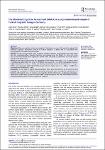The Montreal Cognitive Assessment (MoCA) in a population-based sample of Turkish migrants living in Germany
Krist, Lilian
Keller, Theresa
Sebald, Lisa
Yesil-Jürgens, Rahsan
Ellert, Ute
Reich, Andreas
Becher, Heiko
Heuschmann, Peter U.
Willich, Stefan N.
Keil, Thomas
Liman, Thomas G.
Objectives: Data on cognitive testing in migrants in Germany are scarce. We aimed to evaluate the Montreal Cognitive Assessment (MoCA) in Turkish migrants in Berlin and its association with demographics and health-related variables. Method: For this cross-sectional study, a random sample of persons with Turkish names was drawn from the registration-office. Cognitive function was assessed using the MoCA; 0 = worst, 30 = best total score. Multivariable linear regression models were calculated to determine associated factors with the total MoCA-score. Results: In our analyses we included 282 participants (50% female), mean age 42.3 ± 11.9 years (mean ± standard deviation (SD)). The mean ± SD MoCA score was 23.3 ± 4.3. In the multivariable analysis, higher education (ß = 2.68; p < 0.001), and chosing the German version of the MoCA (ß = –1.13; p = 0.026), were associated with higher MoCA-scores, whereas higher age (ß = –0.08; p = 0.002) was associated with lower MoCA scores. Conclusion: In our study, a higher educational level, lower age, and German as the preferred test language (as compared to Turkish) were positively associated with the cognitive performance of Berliners with Turkish roots. To examine neurocognitive health of migrants, longitudinal population-based and clinical cohort studies that specifically compare migrants and their descendants with the original population of their home countries are required.
No license information

